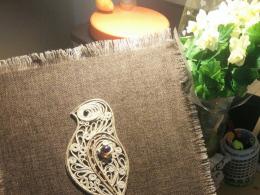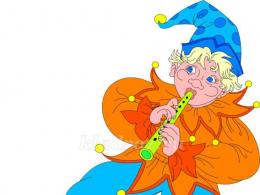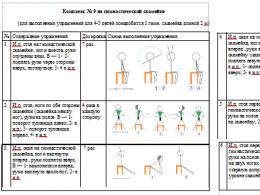Muscles twitch voluntarily. Why are my hands twitching? Muscle spasm or tic hyperkinesis? Consequences of muscle twitching
Many do not regard involuntary muscle twitches as a nervous tic and believe that they will pass on their own. It is almost impossible to find information on the Internet that would systematize all the symptoms and at the same time describe the features of a nervous tic or convulsions of individual parts of the body. In our article, you can find information about the twitching of various parts of the body, their causes and the symptoms of diseases that can cause such phenomena, as well as get acquainted with the methods of treatment.
If you have muscle twitching all over your body or in certain parts of it, you should definitely consult a doctor. He will be able to determine whether it is a nervous tic or seizures. Considering that all human movements must be conscious and coordinated, a nervous tic not only brings discomfort to the perception of one's body, but can also signal mental, vegetative-vascular and immune diseases. It should be borne in mind that self-medication will not always be effective, and often cause irreparable harm, it is worth seeking the advice of a doctor. Let's look at certain types of nervous tics and hyperkinesis of various parts of the body in more detail.
Nervous tic- this is muscle contraction, which is characterized by arrhythmia and involuntary character. It can be temporary and permanent. A temporary effect can be caused by strong feelings, fear, or a pinched nerve. And a permanent tick is formed with a lack of trace elements after an illness.
Types of nervous tic and hyperkinesis:
- Grinding of teeth.
- Twitching of the wings of the nose.
- Brief twitching of the muscles of the limbs.
- Shaking the head.
- Nervous tic from hyperkinesis during sleep.
Also tick is divided depending on localization:
- Local tick is manifested in the contraction of one muscle group.
- A generalized tick combines the simultaneous contraction of several groups at once and at the same time they begin and stop at the same time.
Consequences of muscle twitching
The causes of a nervous tic can be:
Lack of vitamins and trace elements such as potassium or iron;
Head injury;
Prolonged emotional and mental stress;
strong feelings;
pinched nerve;
Neuralgia or vegetative-vascular dystonia.
Consequences that can lead to the lack of treatment of nervous tics:
Pinched nerve and increased muscle tension;
If the cause of a nervous tic is vegetovascular dystonia, then the result may be a violation of blood circulation;
A nervous tic caused by excessive physical exertion can lead to convulsions or partial loss of limb mobility.
Why does involuntary twitching of the muscles of the arms and legs occur?
 Considering that the muscles of these parts of the body are most involved in everyday life, their twitches can be caused not only by psycho-emotional, but also by strong physical stress. For example, after a long workout with weights, a phenomenon such as twitching of the muscles of the arms and legs can be observed. As a rule, such phenomena pass on their own within a few days. However, if the twitching continues for a long time, you should definitely consult a doctor, first of all, a therapist who determines the need to consult a neurologist, psychologist or neurosurgeon.
Considering that the muscles of these parts of the body are most involved in everyday life, their twitches can be caused not only by psycho-emotional, but also by strong physical stress. For example, after a long workout with weights, a phenomenon such as twitching of the muscles of the arms and legs can be observed. As a rule, such phenomena pass on their own within a few days. However, if the twitching continues for a long time, you should definitely consult a doctor, first of all, a therapist who determines the need to consult a neurologist, psychologist or neurosurgeon.
Why does the muscle on the shoulder twitch
 Spontaneous twitching of the muscles of the shoulder joint can be caused by physical exertion. This phenomenon is usually observed in athletes or people whose profession is related to loading and unloading. If the twitching is permanent, then it may be due to a lack of potassium in the body. In this case, after consulting a doctor, medication will be prescribed, including vitamin therapy. In addition, twitching of the left shoulder may be associated with heart disease, so if such a symptom occurs, it is recommended to consult a general practitioner or cardiologist.
Spontaneous twitching of the muscles of the shoulder joint can be caused by physical exertion. This phenomenon is usually observed in athletes or people whose profession is related to loading and unloading. If the twitching is permanent, then it may be due to a lack of potassium in the body. In this case, after consulting a doctor, medication will be prescribed, including vitamin therapy. In addition, twitching of the left shoulder may be associated with heart disease, so if such a symptom occurs, it is recommended to consult a general practitioner or cardiologist.
Why does the nose twitch
 Twitching of the nose, involuntary sniffing is quite often caused precisely by psychological experiences. This type of twitching requires a mandatory visit to a neurologist. If such a tick is of a one-time nature, it would be advisable to take sedatives and do soothing breathing exercises. Facial massage will also help in eliminating a nervous tic if it is associated with an overstrain of facial muscles.
Twitching of the nose, involuntary sniffing is quite often caused precisely by psychological experiences. This type of twitching requires a mandatory visit to a neurologist. If such a tick is of a one-time nature, it would be advisable to take sedatives and do soothing breathing exercises. Facial massage will also help in eliminating a nervous tic if it is associated with an overstrain of facial muscles.
Why does the head twitch involuntarily
 Head tremor can be caused by various serious diseases:
Head tremor can be caused by various serious diseases:
Multiple sclerosis;
Neuralgia;
Cerebellar disease;
Abuse of alcohol and drugs;
Severe stress;
Side effects from taking various drugs.
Such twitches are divided into benign and malignant.
Benign, as a rule, are not associated with any serious diseases and do not cause serious discomfort to the patient. As a rule, this type of tremor occurs in adolescence due to insufficient work of the thyroid gland.
Diagnosis of causes:
Special studies of head tremor;
Electromagnetic radiation of the brain;
Tomography and MRI of the brain.
Why spontaneous leg trembling occurs in a dream
 As you know, brain activity does not stop during sleep. Spontaneous muscle twitching during sleep has even received a scientific name - Simmonds' nocturnal myoclonus. Such shudders do not pose any danger to human health, they are directly related to the activity of the brain during sleep. If involuntary trembling of the legs leads to awakening, then we can talk about Okbom's restless legs syndrome. The main reason why these syndromes occur is neurosis and improper functioning of the subcortical part of the brain. In order to determine what such twitches are associated with, it is necessary to study the work of the vessels, as well as the psychological state of the patient. After identifying the cause, we can talk about the appointment of treatment. It may include:
As you know, brain activity does not stop during sleep. Spontaneous muscle twitching during sleep has even received a scientific name - Simmonds' nocturnal myoclonus. Such shudders do not pose any danger to human health, they are directly related to the activity of the brain during sleep. If involuntary trembling of the legs leads to awakening, then we can talk about Okbom's restless legs syndrome. The main reason why these syndromes occur is neurosis and improper functioning of the subcortical part of the brain. In order to determine what such twitches are associated with, it is necessary to study the work of the vessels, as well as the psychological state of the patient. After identifying the cause, we can talk about the appointment of treatment. It may include:
Taking sedative and epileptic drugs;
Rest and lack of psychological stress can be shown;
Massage and muscle relaxation;
Dieting and taking vitamins.
What to do if the muscles twitch on their own
If this problem occurs, first of all, it is worth analyzing the previous few days, in the event that such twitches are one-time. If a few days before the onset of such a symptom, there was severe stress, nervous tension, or a psycho-emotional state, then you need to have a good rest, do breathing exercises, and such twitches will disappear on their own.
If there are chronic diseases, such twitches may be associated with their exacerbations or the general course of the disease. In this case, it is necessary to contact, first of all, a therapist who will determine a specialist whose competence is qualified to answer the question of why twitching occurs and how to eliminate them.
After consulting a therapist, such a cause of twitching as beriberi, namely, an insufficient content of potassium and iron in the blood, can be established. In this case, the most effective treatment will be vitamin therapy and the use of special preparations.
If there is a constant or prolonged twitching of the muscle, it is imperative to examine the vascular system: do an electro- or tomographic study of the brain, which will answer the questions: what is it - a pinched nerve or insufficient blood circulation of the brain, which in turn can cause involuntary twitching muscles in various parts of the body.
In the event that the twitching of the muscles of the arms and legs arose after prolonged strength exercises, first of all, physical activity should be excluded and the muscles should be allowed to rest. This type of twitching usually resolves on its own within a few days and does not recur.
Video: Neuroses and muscle spasms
Conclusion
Involuntary twitching of various muscles can be uncomfortable. Therefore, if such symptoms occur, it is recommended to consult a specialist, since involuntary muscle twitching is not always associated solely with the transferred stress or increased physical activity. Sometimes such twitches can be caused by various serious diseases and are their only symptoms. Timely consultation with a doctor will not only eliminate twitching, but also prevent their further occurrence.
Be sure to read about it

Our body reacts to various changes in the body, and this is normal. After all, this is the only way to recognize the disease and diagnose it in time. Many people notice that the muscles on the body can sometimes twitch, what does this mean and can such a symptom indicate a danger to your health?
Why Muscles Twitch: Causes
Cramps in the legs, arms, or other parts of the body are observed in many people. Most perceive them as a natural phenomenon, despite the discomfort. If you turn to specialists, then any doctor will tell you that it is not so easy to determine the exact cause of seizures and often you have to go through several examinations.
When should you seek medical help? If your muscles twitch very infrequently, don't panic. If you notice that convulsions appear very often (several times a week), consult a doctor. In addition to discomfort, this symptom can signal the presence of a serious problem.
Why are the muscles in my arm or leg twitching? There may be several reasons and it is not so easy to determine a specific one. Below we present the possible causes of seizures:
Nervous tic- has an involuntary character, can be both permanent and temporary. Most often, a nervous tic appears after stress, anxiety, illness, when a nerve is pinched, after a fright, with vegetative-vascular dystonia, neuralgia, and also due to a deficiency of vitamins or minerals. With a nervous tic, one muscle or several can contract.
Check out our article Why Muscles Hurt After a Workout
Physical overexertion (for example, training). To avoid cramps, do not forget to warm up well before training and stretch at the end. Try not to overdo it and calculate your strength.
Abuse of alcohol, drugs.
The use of drugs.
Diseases of the heart and blood vessels.
Diseases of the nervous system.
To determine the specific cause, the doctor examines the patient and prescribes the necessary examinations. Treatment is based on an accurate diagnosis.
Muscles on the body twitch: what to do?
As we have said, treatment depends on the diagnosis. If convulsions rarely bother you, analyze the last few days - have you had any stress or heavy physical exertion? Perhaps the cause of muscle twitching is fatigue.
Try to rest more, exercise less and not be nervous. If proper rest does not help and convulsions reappear, you cannot do without the help of a doctor.
If twitches are observed frequently, it is necessary to detect the disease. Depending on the diagnosis, treatment is prescribed - it can be both vitamin preparations and drugs for the nervous, cardiovascular system. Have a cup of chamomile tea before bed and avoid caffeinated drinks (coffee and green tea) for a few days.
Also, massage does not hurt, you can do it yourself. Massage the muscles for 5-10 minutes, relax. Contrasting douches would not hurt here, they will not only strengthen the immune system, but also increase the tone of your muscles.
Do not forget about a high-quality vitamin complex. It is possible that your body lacks some vitamin or mineral. Herbal sedatives, such as valerian or motherwort, will also not interfere.
 When do you need to urgently see a doctor?
When do you need to urgently see a doctor?
In some cases, it is still better to seek emergency medical attention. If you feel severe pain in any part of your body, swelling or redness, do not wait for your condition to worsen and consult a doctor.
Involuntary muscle twitching can be uncomfortable, which is why when identifying this symptom, you need to determine the cause. It is possible that seizures indicate the presence of a serious chronic disease, and the sooner you start treating it, the better.
Dear doctor! I am addressing you with the following question: I am 25 years old, female gender, I have never been ill with nervous diseases before, in childhood there was nothing but SARS and a chronic runny nose, there was no measles, at 18 years old chickenpox without complications, the last two years - a couple of times tracheitis with persistent cough. So it's like nothing else. Symptoms - I have several days of muscle twitching. Rather, it was like something under the skin rolling or pulsing, then in the calf, then under the knee, then in the buttock, then in the hands somewhere, in the stomach. Occasionally it happened that the leg twitched a little, as if it shuddered, but there was no large amplitude of movement. And the little finger on his hand twitched a couple of times. Cheek once. Most often, something rolls under the knee and in the calf muscle. Sometimes half an hour or an hour is nothing, sometimes 5-7 such nasty things per hour. There is only in the sitting and lying position, if you stand, there is no walking. They are not provoked by anything, they arise on their own. Probably, if I'm nervous, there are more of them. Sometimes attacks of trembling (whole body, especially from above, like chills, but without fever). A few more times, either a vein was pounding, or something under the skin on the side of the head on the right, quickly, quickly like that. For three weeks, the arms and legs began to quickly numb, the legs in a sitting position are simple, especially the feet, and if the hands are propped up on the chin, etc., it tingles, numb, earlier, in order to try hard, it was necessary to squeeze it like that. Three more days - when I lie down in the dark and close my eyes, or if I wake up - sometimes something quickly, quickly, like patterns, but not colored, pulsates before my eyes, as something unfolds, shrinks, rotates, pulsates or to the beat of the heart , or these pulsations in the limbs. If you sit down, open your eyes, do a couple of exercises with your hands - it goes away, but if you lie down - it starts again. It can last for 5 minutes, maybe more than an hour, then it goes away. A very unpleasant feeling. There is heaviness in the head, in the back of the head, but not strong and not all the time. A month before, clicks appeared and remain in the throat (ears?) When swallowing, sometimes there are unpleasant sensations in the throat (like a slightly cold), but the ENT does not see any pathology. several times it was that with her head down or lying down, when she was very tired or nervous, her voice became strange, well, like with distortion, trembling or something, like a vibration, "trrr-trrr" is like a special computer effect, if you clear your throat became normal. This is with the voice and clicks my person heard, this is not my hallucination. I have trouble with memory, names and titles fell out, the name of a girlfriend, the names of Japanese actors well known to me, a girlfriend and these actors have been known to me for 2 years. (although I easily remember the names of all the characters in the series that I watched at the age of 17-18, the names of the characters from the books that I read as a teenager). I panic, I try to remember and emptiness. After some time, the name itself comes to mind, almost all of them, some of them were not remembered without a hint. Before that, there were three months of irritability, tearfulness, emotional lability, anxiety for three months, an incomprehensible certainty that I would not live to see the winter, nightmares of a medical nature and all sorts of thoughts that I had some kind of terrible sore. Two months ago, the ring finger was numb for two days, but it passed. And one attack of twitching of all muscles, at night, here and there they contracted, without moving the limbs. It didn't happen again. Thyroid hormones are normal. Menstruation began to go less days than before (there is polycystic ovaries). FLG and abdominal ultrasound were normal. The temperature is normal. The pressure is 130/80, sometimes 140/90, it may have been higher, but there is no way to measure it at home - there is nothing. there is no loss of sensitivity, there are really no headaches - but sometimes it presses the lower part of the face when tilted, and sometimes it slightly presses the temple and one point on the top of the head, a couple of times there was a slight throbbing pain in the right side of the head, with heaviness. easily removed with analgin. Appetite and temperature are normal (although more often 36.9 than 36.6). no nausea. pains - sometimes a little under the breasts, as they happened in the ribs themselves, a couple of times in the spine in the middle section they shot, today the shoulder-collarbone hurt, maybe it turned awkwardly, it took about 15 minutes, the neck, shoulders and knees crunch very strongly. Sometimes a slight unpleasant pressing sensation in one ear, then in the other (but does not lay). Three weeks ago, a neurologist diagnosed astheno-depressive syndrome and prescribed glycine, drank - there was zero sense. A week ago, a psychotherapist prescribed Adaptol three times a day 500. Plus, she herself began to drink ascorutin once a day (the blood vessels in her nose had burst for a long time), and vitamins of group B multitabs three times a day. Saw. Adaptol soothed, but these jerks and pulsations began. Three weeks ago, the neurologist did not reveal anything strange when hitting with a hammer, the eye movements are in order, I calmly poke my finger into the nose with my eyes closed, I keep my balance with my eyes closed, if I run it in every possible way on the foot and on the lips - no pathological reflexes. There was a lot of stress during the year. Can you please tell me which test should I take? Ultrasound of the vessels of the head and neck? Brain MRI? Neck MRI? ENMG? EEG? It's just that there is absolutely no money for one thing, and there is nowhere to take another 2 weeks.
Many people have experienced leg cramps. Such involuntary muscle contraction may be associated with a serious disease that requires mandatory treatment. Sometimes muscle twitches can occur for no reason, then they talk about physiological cramps that do not require treatment.
If involuntary muscle contraction occurs very often, and is accompanied by severe pain, then you should consult a doctor for advice. Perhaps such a symptom is a signal of the body that it has experienced violations that require intervention.
In a healthy person, muscles are constantly in good shape, they contract and relax. Thanks to the muscles, we can not only move and keep a static position, but we can also live, because this tissue is involved in the most important metabolic processes of the body.
Most often, painful twitching of the calf muscles develops. The symptom may appear during active physical activity or during rest, which happens most often. When muscles are warm and relaxed after strenuous exercise, they are more prone to cramps.
As a rule, a cramp of the lower limb is accompanied by severe pain, so the patient needs first aid. You can help yourself, the main thing is to know the procedure in such cases:
- First of all, you need to sit or lie down to reduce the load on the spasmodic leg and prevent injury when falling.
- Then it is necessary to achieve relaxation of the muscle, for this you need to take the foot in your hands and pull the toe towards you. The patient will feel pain, but after that the attack will immediately begin to pass.
- So that later the leg does not hurt, it is necessary to rub the sore muscle, and massage it well. And after relieving pain, it is recommended to perform stretching exercise.
If convulsions occur throughout the body (generalized), then this may be a sign of epilepsy. In this case, the patient is laid on a flat surface, the head is placed on its side to open the airways. Do not put hard objects into the patient's mouth, it can be dangerous to his health. With convulsions throughout the body, you should immediately call an ambulance.
Treatment
Muscle twitching is treated in different ways, depending on the cause of the symptom. If the muscles are twitching due to beriberi, then it will be enough to start eating right and taking vitaminsso that the cramps no longer appear.
If the muscles begin to twitch after a hard day's work, then you should think about changing your profession. Many people who work on their feet are wondering why cramps appear in the evenings. This may indicate degenerative changes in the joints, which require proper and timely treatment.
For more serious pathologies, diet and physical education are not limited, most likely you will need to undergo medical treatment, and the doctor will also prescribe a set of physiotherapy procedures. In some cases, even surgery may be necessary.
In any case, self-medication is not worth it, because convulsions can talk about a variety of diseases that are treated in different ways. If you constantly ignore cramps and do not consult a doctor, other symptoms may soon appear, for example, pain, impaired motor activity in the limbs.
Video: Neuroses and muscle spasms
In the language of images, our body is a huge biochemical concern with multiple interconnections, the coordinated work of which implies a calm and stable course of the process.
But life has its own way. If, after a normal walk, the leg muscles suddenly begin to noticeably twitch, and the muscle of the left or right hand contracts on its own while watching your favorite movie, if sports exercises bring torment instead of benefit and joy, a person begins to worry, look for a reason, experiencing a whole range of feelings: from surprise to panic.
Why does a person's muscles throb? Muscle twitches, or fasciculations, are familiar to almost everyone. One has a muscle twitch in his arm. In another, for a very long time, something twitches a muscle in the leg above the knee. Someone complains of wandering effects in the chest.
- physical and psychological overstrain (stress, anxiety), both short-term and long-term;
- functional lack of nutrients in the body, magnesium deficiency;
- hypothermia;
- chemical stress - exposure to toxins.
If there is no pain, spasms and convulsions, there is no need for urgent medical intervention, you should be aware of the individual primary sources of unpleasant sensations that have appeared and find the best solution to this problem.
Physical education and sports
Artem, 22 years old: “I have been doing judo for 12 years. Sometimes I notice how the muscle on the arm twitches, it beats itself under the skin. What's happening?". Athletes often wonder why after a workout, when the body is already in a calm state, they can spontaneously twitch in the chest, on the shoulder, just above the knee, the muscles of both legs are shaking.
Why is excessive sudden physical activity often the cause of rather painful sensitivity and even cramps of individual muscle groups, why do they pulsate, is it dangerous? Perhaps because the body is warmed up incorrectly or insufficiently during the preliminary warm-up, the training does not take into account the rule of gradual increase in effort, and the smooth stretching after class is ignored.
It is necessary to alternate tension with obligatory proper rest, pause more often, auto-training and self-massage before and after training.
Muscle spasms due to stress
Excessive workload, chronic lack of sleep, family quarrels, studies, exams, checks, acute everyday issues, financial problems ... It is not surprising that after all this, for some reason, the muscles in the whole body contract, distract and disturb, pulsing by themselves, do not give sleep. Often you can visually note how the muscle trembles finely and twitches for no reason on the arm, which additionally depresses the loosened psyche.
What to do if a muscle twitches? Doctors unanimously recommend starting with the organization of sleep and rest.
- Take a walk, get some fresh air before bed.
- Drink a cup of chamomile tea or just a glass of warm water with the addition of a spoonful of natural honey.
- Learn to listen and slow down your breathing; breathing exercises are very effective after any overexertion.
And if you combine all this with physical education, relaxing massages and contrast douches, you can change the quality of your life.
"Bride Syndrome"
No, this is not a runaway bride. These are often unaccountable worries that “everyone around is married”, and a physiological reaction to a protracted stressful situation. The general condition is expressed in depression, pulsations in any part of the body - on the face, thigh, - for no apparent reason, twitch by itself, disturb the muscles throughout the body. This is a kind of call of nature to the creation of a family and the birth of children.
Complete nutrition or vitamin supplements
There is one truth: if you get sick - change the power system; did not help - change your lifestyle and only then consult a doctor.
In case of any deviations from the normal state, it is necessary to look closely at the eating habits and immediately exclude:
- foods and drinks containing chemical additives;
- sugar;
- excess salt;
- alcohol;
- coffee and black tea.
In daily nutrition, you need to pay attention to the constant use of several basic trace elements: phosphorus, potassium and magnesium, as well as vitamin D.
- Phosphorus coordinates the reactions of the central nervous system and muscle work. Sources of phosphorus: sea fish, dairy products.
- Magnesium dilates blood vessels and relieves spasms. The use of coffee, alcohol, diuretics completely blocks its action, "washes" it out of the body. The vacated place replaces calcium, which is the main cause of muscle contraction. Sources of magnesium: natural cocoa, whole grains, hard drinking water, sesame, oatmeal.
- Potassium is responsible for the operation of the cellular pump, excess water in the body. Potassium salts are found in large quantities in fruits and vegetables.
Regarding vitamin D, its dual function should be noted: on the one hand, a clear benefit in the process of absorption of the first three listed elements from the intestines, on the other hand, in excess, possible vascular calcification. When using, adhere to the norm. Contained in oily fish, yeast, algae. Can be synthesized in the body by exposure to sunlight.
If a choice has already been made in the direction of the latest achievements of domestic and foreign pharmaceuticals, it is better to lay all responsibility on a specialist, and not reap the fruits of one's amateur actions.
Leave your fears
Depending on the intensity, frequency and location of the muscle that twitches on its own, people, not understanding what it is, react differently to such deviations. Some with a desperate cry of "Why?!" immediately rush to the specialists, demonstrating the muscle on the shoulder. Or they report that the muscle in the leg has been twitching for a long time (several months!). Less suspicious ones simply adapt, change their way of eating and lifestyle.
If you have not yet figured out why a muscle on your left arm is twitching or contracting by itself, or a group of muscles on your leg is pulsating, but you are in normal physical shape - the body does not atrophy, speech and coordination of movements are not disturbed - you should not fall into extremes and, like the protagonist of the humorous story "Three in a boat, not counting the dog", who found in himself all conceivable and unthinkable diseases, to bequeath his body to medicine.






